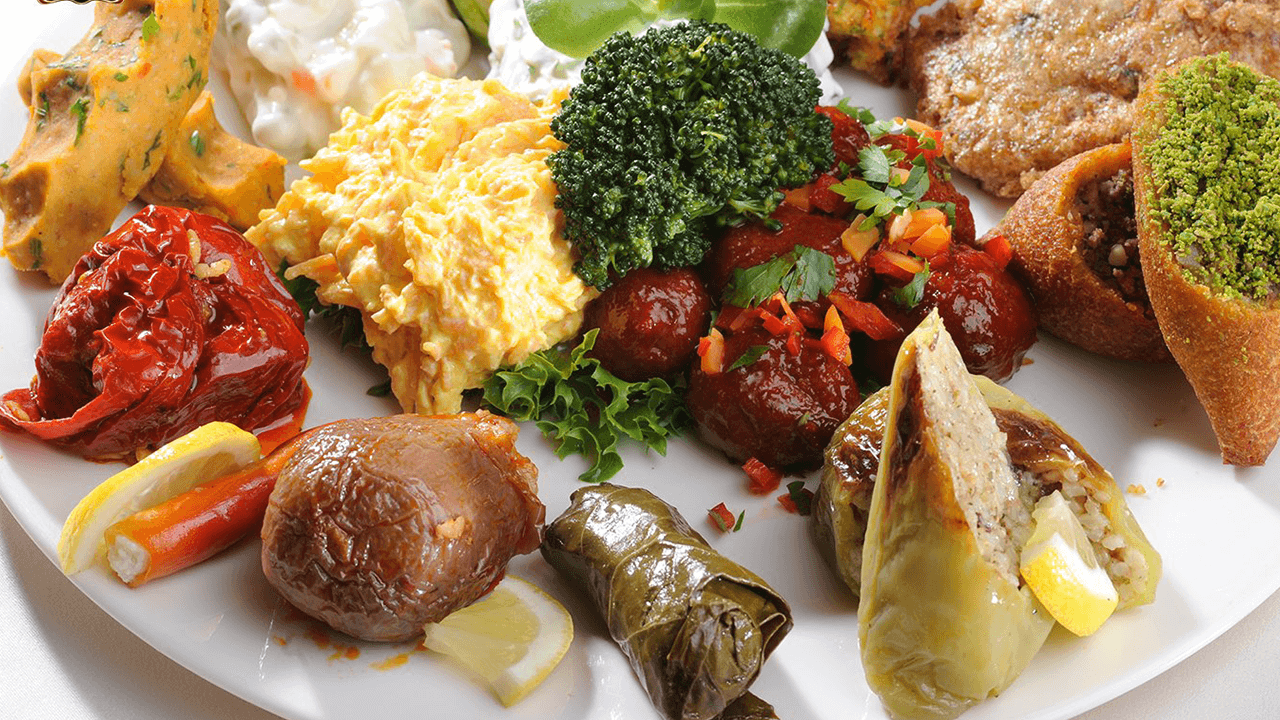Turkish Cuisine and Ephesus Specialties: A Unique Culinary Experience
Renowned for its richness and diversity, Turkish cuisine offers a gastronomic journey through centuries of history and culture. Influenced by civilizations such as the Ottomans, Byzantines, and Seljuks, Turkish food is a harmonious blend of flavors and aromas, combining Mediterranean, Middle Eastern, and Central Asian culinary traditions. This article explores the highlights of Turkish cuisine and the distinctive flavors of the Ephesus region, a must-visit destination for food lovers.

Characteristics of Turkish Cuisine
Turkish cuisine is celebrated for its versatility and the freshness of its ingredients. Rooted in a tradition of shared meals and hospitality, it emphasizes balance and flavor. Here are its main features:
- Staple ingredients: Grains, legumes, fresh vegetables, and olive oil form the backbone of Turkish cooking, accompanied by lamb, chicken, or fish. Pork is not consumed due to religious customs.
- Spices and herbs: Turkish dishes often feature spices such as sumac, cumin, red pepper flakes, and mint. Fresh herbs like parsley, dill, and coriander enhance their aromas.
- Cultural diversity: The cuisine reflects the diversity of Turkey’s regions, offering everything from hearty stews and stuffed vegetables to delicate pastries and seafood specialties.
Iconic Dishes in Turkish Cuisine
Döner Kebab
The quintessential Turkish dish, döner kebab consists of thinly sliced lamb, chicken, or beef, slow-roasted on a vertical spit. Served in pita bread, with vegetables or rice, it’s a popular street food across Turkey.
Dolma and Sarma
These stuffed dishes are staples of Turkish cuisine. Dolma refers to vegetables like peppers, tomatoes, and zucchini stuffed with rice, pine nuts, and spices, while sarma specifically refers to vine leaves filled with similar ingredients.
Köfte
Turkish meatballs made with ground beef or lamb, köfte is flavored with onions, breadcrumbs, and a mix of spices. They can be grilled, fried, or baked and are served with yogurt or salad.
Lahmacun
Often called “Turkish pizza,” lahmacun is a thin flatbread topped with minced meat, onions, and spices. It’s served rolled up with parsley, lemon juice, and often a side of ayran (a yogurt-based drink).
Baklava
This world-famous dessert is made with layers of phyllo dough, chopped nuts (often pistachios or walnuts), and syrup or honey. Baklava is a decadent treat enjoyed throughout Turkey and beyond.
Specialties of Ephesus
The region around Ephesus, known for its ancient ruins and rich history, offers culinary delights that reflect the traditions of western Turkey. These specialties are must-tries for anyone visiting this part of the country:
Çöp Şiş
Small pieces of marinated lamb or chicken skewered and grilled, çöp şiş is a specialty of the Aegean region. The marinade often includes yogurt, tomato paste, and garlic, giving the meat a tender and flavorful finish.
Tulum Cheese
This aged sheep’s milk cheese is a specialty of Izmir and nearby areas. Traditionally stored in goat or sheep skin bags, tulum cheese has a tangy, crumbly texture that pairs perfectly with fresh bread and olives.
Macun
A vibrant, colorful paste made from a mixture of spices and herbs, macun is a traditional sweet treat in the Ephesus region. Often sold at festivals, it represents centuries of culinary creativity.
Traditional Turkish Breakfast (Kahvaltı)
No visit to Turkey is complete without experiencing a traditional kahvaltı. This elaborate breakfast spread typically includes:
- Cheeses (beyaz peynir and kaşar are common).
- Fresh vegetables like tomatoes and cucumbers.
- Olives, eggs (often boiled or scrambled with tomato and pepper, known as menemen).
- Jams, honey, and kaymak (clotted cream).
- Freshly baked bread and a steaming glass of Turkish tea (çay).
Soups and Salads
Turkish meals often begin with çorba (soup) and include fresh, flavorful salads. Here are some popular options:
Soups
- Mercimek Çorbası: A comforting lentil soup, often spiced with paprika and mint.
- Tarhana Çorbası: Made from a fermented mix of yogurt, flour, and vegetables, this soup is a winter favorite.
Salads
- Çoban Salatası: A refreshing shepherd’s salad with tomatoes, cucumbers, green peppers, and onions, dressed with lemon juice and olive oil.
- Patlıcan Salatası: A smoky eggplant salad mixed with garlic, yogurt, and olive oil.
Tips for Enjoying Turkish Cuisine
- Experiment with local dishes: Don’t hesitate to try regional specialties, as they showcase Turkey’s culinary diversity.
- Visit traditional restaurants: Look for lokantas (local eateries) to enjoy home-style Turkish cooking.
- Pair meals with Turkish beverages: Raki (an anise-flavored spirit) complements seafood, while ayran is a refreshing choice for grilled dishes.
Conclusion
Turkish cuisine offers a culinary adventure unlike any other, blending the traditions of multiple cultures into a harmonious tapestry of flavors. From hearty main courses like döner kebab and köfte to sweet delights like baklava, every meal is an experience to savor. For food lovers, exploring the local dishes and regional specialties of Ephesus and beyond is an essential part of any trip to Turkey.












3 thoughts on “Turkish Cuisine and Ephesus Specialties ”
★★★★★
Learning about and visiting ‘Turkish Cuisine and Ephesus Specialties ‘ was both fun and educational. Everyone should experience this!
★★★★★
Every moment spent at ‘Turkish Cuisine and Ephesus Specialties ‘ was filled with wonder and learning. It’s a place I will always cherish.
★★★★★
I was blown away by everything ‘Turkish Cuisine and Ephesus Specialties ‘ has to offer. Definitely a place to return to in the future.